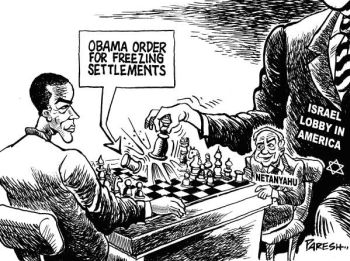
Publisher:
Bonnie King
CONTACT:
Newsroom@Salem-news.com
Advertising:
Adsales@Salem-news.com

~Truth~
~Justice~
~Peace~
TJP
May-07-2010 17:29

 TweetFollow @OregonNews
TweetFollow @OregonNews
A Light is Cast Upon pro-Israel Groups
Rami Khouri Special to Salem-News.comThis is only the latest and most substantive of many examples of how the work of pro-Israeli groups in the US is being forced onto the stage of public analysis and debate.
 Special thanks to The Daily Star |
(BEIRUT) - The pro-Israel lobby prefers to work quietly in the background to define the Middle East foreign policy debate in the US – but now finds itself part of that agenda that is being debated in public.
One of the fascinating aspects of recent tensions between the American and Israeli governments over Washington’s Middle Eastern diplomacy has been a sea-change in the public posture of what is usually called “the Israeli lobby” in the United States. This phrase refers to a very sophisticated, extensive and successful web of American organizations and individuals that work to shape American foreign policy so that it favors the prevalent Israeli rather than Arab view of things.
The pro-Israel lobby includes mainstream American Jewish groups but also fundamentalist Christian organizations. They have been able since the 1970s to shape the main contours of Washington’s policy in the Middle East on anything that touches or approaches Israeli concerns, by using perfectly legal and routine levers of political influence in the United States that target the political class and public opinion.
The most important is using immense local and national pressures (funding and votes) on members of Congress and the president to keep them in line with pro-Israeli sentiments, or else risk losing the next election (therefore Congress routinely, as it did in recent weeks, issues letters signed by a large majority of its members declaring strong support for whatever Israel asks them to support).
This is complemented by persistent and professional activities to shape the public environment primarily through influencing media, including portraying Israel as a consistent strategic ally of the United States and the Arabs, Iranians and selected others as dangerous to both Israeli survival and American values. This includes activities by dozens of pro-Israeli groups that give the appearance of being independent American organizations, but are seen by many to work primarily to promote pro-Israeli sentiments, policies and interests, like Campus Watch, CAMERA, MEMRI, the Washington Institute for Near East Policy (WINEP), the American Israel Public Affairs Committee (AIPAC) and others.
The significant recent development is that these and other such groups have been pulled out of the world of the shadows where their agenda has always found comfortable and successful camouflage, and they are now routinely discussed in public in two main contexts: Are they working for the best interests of the United States or that of Israel? Is their strong influence on American public opinion and foreign policy a good or a bad thing for the United States?
The novel public debate about the pro-Israel lobby in the US was highlighted a few weeks ago by a fascinating exchange in Foreign Policy magazine between Stephen Walt of Harvard University (the co-author with John Mearsheimer of the University of Chicago of “The Israel Lobby and US Foreign Policy”) and Robert Satloff, director of the Washington Institute for Near East Policy. They exchanged thoughts on the issues raised by Walt in response to an earlier article by an American journalist who quoted a Washington source as suggesting that long-time State Department and White House official Dennis Ross was “far more sensitive to Netanyahu’s coalition politics than to US interests.”
The Walt-Satloff exchange touched on several issues, the main one being whether WINEP was an independent American institution doing independent analysis, research and policy recommendations or whether it was an integral part of the pro-Israel lobbying and public relations efforts. (A subsequent article in mediamattersaction.org, by M. J. Rosenberg, offered confirmation that WINEP is and always has been a creation of the pro-Israel lobby, by recounting events he participated in when AIPAC decided to create WINEP in a manner that disguised its connections to the pro-Israeli world in Washington.) The discussion continues.
This is only the latest and most substantive of many examples of how the work of pro-Israeli groups in the US is being forced onto the stage of public analysis and debate, with the main question being: Is the line they push good for the US national interest or only designed to help Israeli hawks? The pro-Israel lobby groups are not comfortable being assessed in this manner, especially because of insinuations of dual loyalty or conflict-of-interest that often lurk just below the surface in some discussions.
It was inevitable that this public discussion would occur, once the Obama administration decided to push hard for Arab-Israeli negotiations that started to separate US national interests from Israeli national interests, without compromising the fundamental American commitment to the survival and security of Israel within its 1967 borders.
The pro-Israel lobby prefers to work quietly in the background to define the Middle East foreign policy debate in the US – but now finds itself part of that agenda that is being debated in public. I suspect this is because many people in power in Washington are starting to feel the pain and the consequences of the US pursuing a stridently pro-Israeli policy for decades on end, and are exploring new approaches to securing American, Israeli and Arab legitimate national interests simultaneously.
This article was first published in: The Daily Star.
 Rami George Khouri is a Palestinian-Jordanian and US citizen whose family resides in Beirut, Amman, and Nazareth. He is the Director of the Issam Fares Institute of Public Policy and International Affairs at the American University of Beirut as well as editor-at-large of the Beirut-based Daily Star newspaper. He is an internationally syndicated political columnist and author.
Rami George Khouri is a Palestinian-Jordanian and US citizen whose family resides in Beirut, Amman, and Nazareth. He is the Director of the Issam Fares Institute of Public Policy and International Affairs at the American University of Beirut as well as editor-at-large of the Beirut-based Daily Star newspaper. He is an internationally syndicated political columnist and author.
Rami was a visiting scholar at Stanford University in October 2006, and in November 2006, he was the co-recipient of the Pax Christi International Peace Award for his efforts to bring peace and reconciliation to the Middle East. He is published twice weekly by THE DAILY STAR.
Articles for May 6, 2010 | Articles for May 7, 2010 | Articles for May 8, 2010

Quick Links
DINING
Willamette UniversityGoudy Commons Cafe
Dine on the Queen
Willamette Queen Sternwheeler
MUST SEE SALEM
Oregon Capitol ToursCapitol History Gateway
Willamette River Ride
Willamette Queen Sternwheeler
Historic Home Tours:
Deepwood Museum
The Bush House
Gaiety Hollow Garden
AUCTIONS - APPRAISALS
Auction Masters & AppraisalsCONSTRUCTION SERVICES
Roofing and ContractingSheridan, Ore.
ONLINE SHOPPING
Special Occasion DressesAdvertise with Salem-News
Contact:AdSales@Salem-News.com

Salem-News.com:
googlec507860f6901db00.html

Terms of Service | Privacy Policy
All comments and messages are approved by people and self promotional links or unacceptable comments are denied.
[Return to Top]
©2025 Salem-News.com. All opinions expressed in this article are those of the author and do not necessarily reflect those of Salem-News.com.